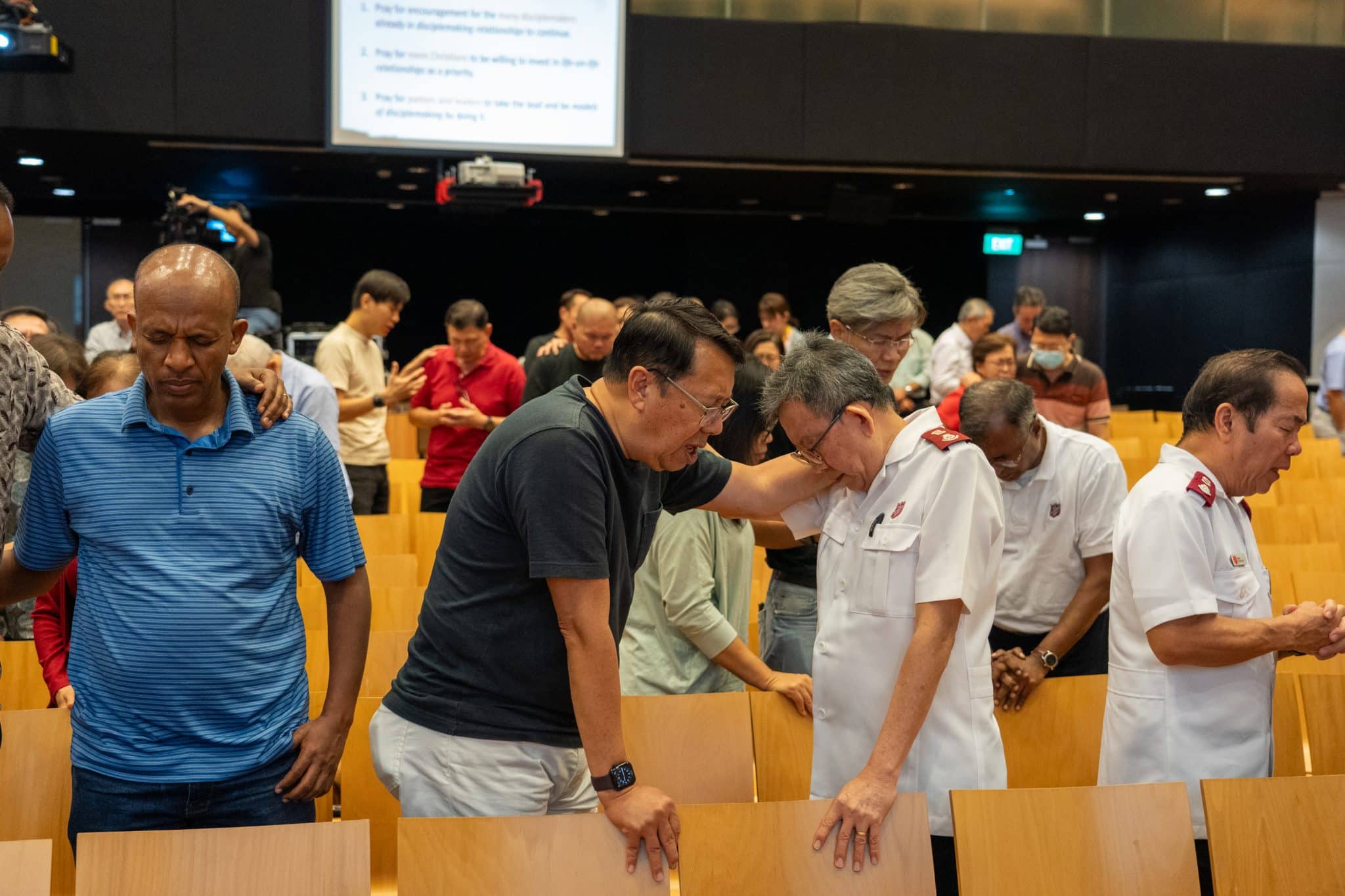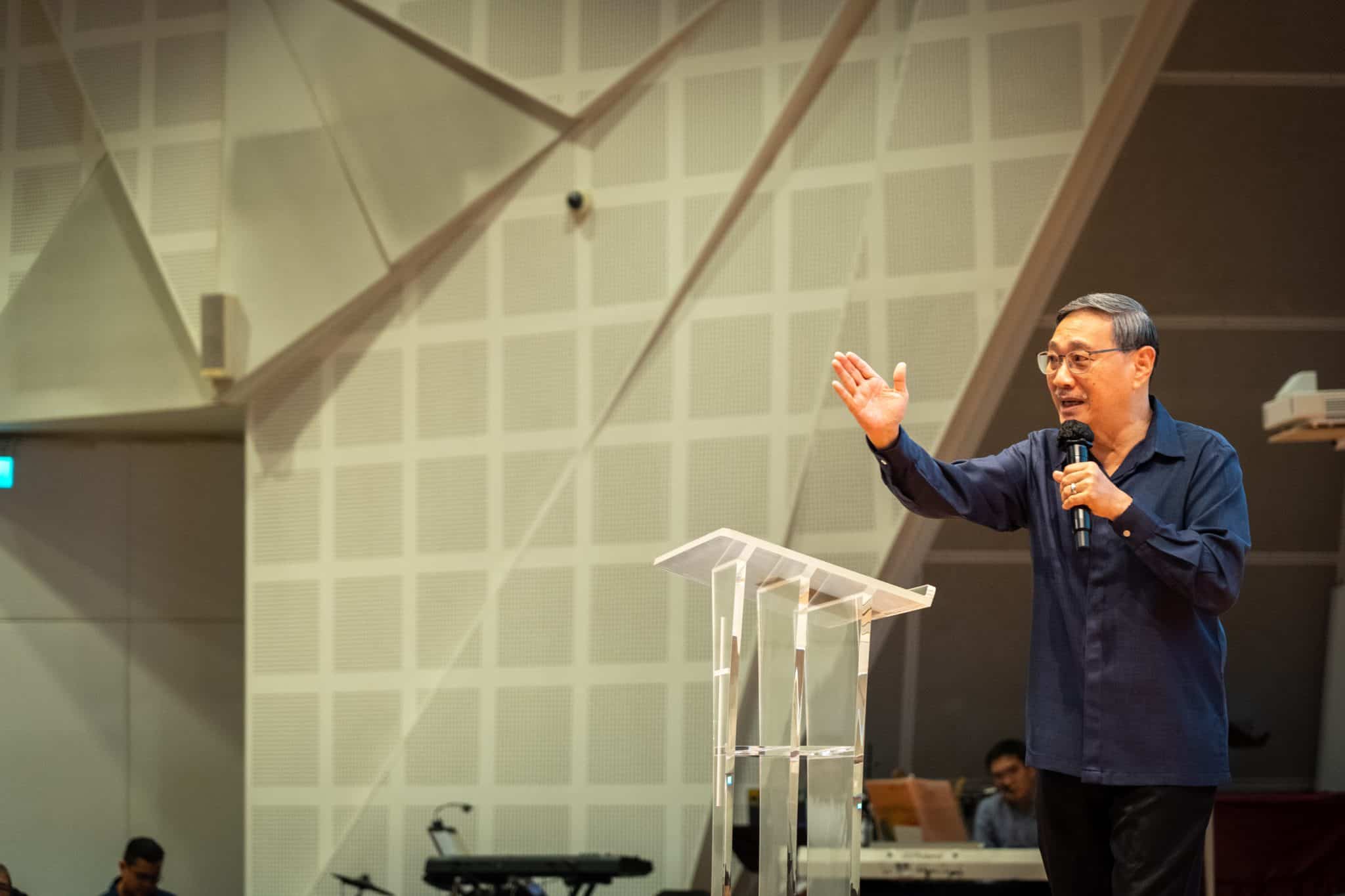“What do you do when you feel like giving up?”: Rev Edmund Chan on Day 2 of Summit 2022
Rev Edmund Chan // January 11, 2022, 6:35 pm

Rev Edmund Chan encouraging participants of Summit 2022 to look to the person of God, the track record of God and the mystery of God when they feel like giving up. Photo by Ang Wei Ming.
The 51-year-old captain and his 28-year-old first officer were on Avianca Flight 52 from Bogota, Colombia, to New York City on January 25, 1990. But the flight never landed at its destination.
It crashed into a hillside 20 miles off JFK airport. Of the 149 passengers, 65 died along with eight of the nine crew members.
Why did it crash? It wasn’t due to an accident on board or a mechanical failure or a fire.
When they investigated, they found that it had run out of fuel. It had been put on three holding patterns due to poor communication and eventually the airplane had run out of fuel.
It was running on empty.
Our wake-up call
This is a wake-up call especially for us pastors and ministers. It is a serious call for us to realise we cannot afford to be running on empty.
I call Psalm 77 the “give-up” Psalm.
But what if it is something more serious than running on empty?
If you’re running on empty, you can top up. If you are tired, you can rest up. But what if we just want to give up?
I want to learn from one of my spiritual mentors in Scripture. His name is Asaph, the psalmist. He is like a very dear friend.
He gave us Psalm 77. I call it the “give-up” Psalm.
In it, he speaks of a time he felt like giving up, of what he learned in his spiritual pilgrimage along the way and of his spiritual compass.
3 Redemptive movements
How do you feel when, in the midst of your distress, you remember God? How do you feel when, in the midst of anxiety, you meditate on His word?
The psalmist entered into the presence of God and caught a sense of his spiritual compass.
When we remember God, we will feel a sense of confidence and comfort in the presence of God. When we meditate on God, we will feel refreshed and energised, we get a sense of clarity. But the psalmist didn’t feel that way.
In Psalm 77:3, he says that when he remembered God, he moaned and his spirit failed. It’s not supposed to happen that way. The psalmist did what he supposed to do but it didn’t work.
Isn’t it frustrating? Can you sense the narrative tension, the pain, the struggle?
What do you do when you feel like giving up?
The psalmist entered into the presence of God and caught a sense of his spiritual compass and he shared with us that spiritual compass in the form of three redemptive inner movements that we find in Psalm 77.
#1 From plight to perspective (Psalm 77:1-9)
Let’s look at Psalm 77:4. He was so depressed and withdrawn that he could not even open his eyes or speak.
Then, in Psalm 77:5, he considered the past and brought the faithfulness of God into his plight. He thought about the good old days of his calling, of the presence of God, of when he was sure that God was there for him.
He looked back and asked five deep questions in three verses (Psalm 77:7-9). These are rhetorical questions. The answer to each is “of course not”. God is not like that.
These questions reflected the anguish of his soul and the foundations of his faith. “He will not forsake me in my distress. He will not forsake me in my disappointment. He will not forsake me in my discouragement. My God is not like that!”
He brought the personhood of God into his perspective. And the psalmist started the journey of pursuing God.
What will we pursue when we feel like giving up?
What we pursue will determine the trajectory of our lives.
In 1994, I went on my first sabbatical in the US. In that year, in the Chicago Tribune was a report of a man who had been crossing the highway in winter. His hat had been blown off and he was chasing after it. A truck came by. The driver didn’t see him in time and slammed into the man, who died.
The Chicago Tribune reported the story with this statement that spoke deeply to my heart: “He lost everything while chasing nothing.”
What do we pursue when we come to a place like this psalmist who was distant, withdrawn, distressed? Because what we pursue will determine the trajectory of our lives.
I want to encourage us to set this year as the year to pursue hard after God because there is no other antidote to the pain and challenges of ministry except when we stand in the power and the glory of God Almighty.
And we have to do it together. That’s why loving one another is so important. We have to stand shoulder to shoulder with one another and encourage one another in this grand pursuit of God.
#2 From fear to faith (Psalm 77:10-12)
From Psalm 77:10-12, Asaph looked at the years of God’s faithfulness. He was bringing God’s track record – what God had done – into his plight. He was bringing God into the equation of his life from his soul.
When I was growing up as a young Christian, one of my mentors was Doug Sparks who was then the Regional Director of Navigators.
The Biblical narrative is not about superiority but the sufficient faith.
One of the deep truths he said to me that I have practised since then, more than four decades ago, was this: “Keep a record of God’s track record in your life.”
So, I keep a journal of God’s faithfulness and encouragement. It is a personal journal of God’s personal grace because I need it. At times, along the way, I have come back to the journal to recognise what God has done.
Go to your past and look at your calling and God’s track record in your life. The past is a terrific place to learn from, a terrible place to live in. Go to the past and learn from it. Then, move on from the past into the future by engaging the present with the power, the grace and the clarity of God.
There are times you may feel so inadequate in the midst of all the challenges.
Remember the story of David and Goliath? If anyone should feel inadequate, it should be David. For 40 days, in the morning and in the evening, Goliath stood before the people of God and challenged them and cursed their God. There were 80 challenges in all.
Yet, when King Saul asked David why he thought he could defeat Goliath, his reply was: “I have faced the lion and the bear. Who is this uncircumcised Philistine?”
He was looking at God’s faithfulness.
When we serve, criticisms and misunderstanding are the terrain of leadership.
Charles H Spurgeon says that when you read the Bible, read it with sanctified imagination. Imagine now, what if the Israelites had been blessed with a giant and the Philistines had nothing? Israel would have won.
Or if they each had a giant. The two giants would meet and fight. Who would win? The superior giant.
But the Biblical narrative is not about superiority but sufficient faith. It changes everything. It wasn’t their superiority, their adequacies or the resources that they had. They looked at God’s faithfulness.
I do not know any leader on this planet who has not been misunderstood or criticised. When we serve, criticisms and misunderstanding are the terrain of leadership.
Whatever challenges and difficulties we are going through are our lion and bear journeys. It is these journeys that give us strength and develop our faith to face Goliath and be victorious with God.
Why give up when we ain’t seen nothing yet. Because God is mightily on the move to bring forth, in this generation, mighty men and women of God who have gone from fear to faith.
#3 From distress to devotion (Psalm 77:13-20)
There is one more thing that is glorious and spectacular that we shouldn’t miss. The psalmist moves us from the personhood of God –who God is – and the track record of God – what He has done – to the holy grail of the glorious mystery of God. As Christian pastors and leaders, we should not lose sight of this mystery of God.
He articulated this mystery in Psalm 77:19. This is the poetic picture of Moses and the deliverance through the Red Sea. Then he says something as a theological footnote: “Your footprints were not seen.”
The key – the secret ingredient – is the breath of life, the Spirit of God.
Theologians calls this the hiddenness of God. Underlying it is the faithfulness of God. There are times when He doesn’t seem to be there, His footprints seem to be unseen. But God is constantly there and faithful.
Why is it that sometimes God seems so distant? Why is it sometimes He doesn’t seem to be around? Why did He allow this to happen? It is part of the divine mystery. In the mystery of God, He is developing our faith and devotion.
Don’t miss the mystery. Celebrate the glory of the mystery.
I want to close with a testimony that tutored my heart ultimately on what is important. At the end of last year in the early part of November, the Lord woke me up at 4am. I woke up immediately, and there was a sense of the presence of God in my room and there was a stirring in my heart: “Son, pray.”
I got up in the darkness, knelt by my bedside and prayed: “Speak Lord, for Thy servant heareth.”
And the Lord laid upon my heart the intensity of spiritual warfare against the church, the people of God and the leaders. The Word that came to me was: “Love not the world, neither the things that are in the world. If any man loves the world, the love of the Father is not in Him.” (1 John 2:15-17)
By the time I finished praying, it was 5.15am. I got up to sleep and the Lord spoke to me a second time: “Son, pray.”
The Lord spoke to me: “The warfare, son, is within.”
I had just told the Lord: “God, I am willing to do anything You tell me to do.”
So, though the flesh was a bit reluctant, I prayed a second time. Then, the Lord spoke to me: “The warfare, son, is within.”
I had gotten the first prayer wrong. I had prayed against money, sex and power. But God said that these are external. What is within is not money but covetousness; what is within is not sex but lust; what is within is not power but pride.
So, I prayed about these inner life issues. I asked for God to purify my heart, purify the church, the church leaders and my family. By the time I was finished, it was 6am.
Then, I heard the Lord say to me a third time: “Son, pray.”
This time I was thinking: Can I just lie down and pray? But in my heart, there was a recognition: In the presence of God, kneel.
So, I got up and knelt. The moment my knee touched the ground, the Lord said to me: “Son, I’m giving you the secret ingredient.”
What is the secret ingredient?
The Spirit reminded me of Ezekiel 37. God wants to raise a great army. Don’t give up, gear up. God is on the move this day. The key – the secret ingredient – is the breath of life, the Spirit of God.
The entire revival is contingent on the move of the Spirit of God. The key to victory is the Spirit of the Living God. I want to be empowered.
I want to end with this quote from Adrian Rogers: “God, I’m tired of being inhibited by my weaknesses and inadequacies. I want to be inhabited by Your might and power.”
Are we inhibited by inadequacies or are we inhabited by God’s might and God’s power? What do we do when we feel like giving up? We come back to the Spirit of the Living God and say: “Lord, fall afresh on me.”
This excerpt is adapted from a sermon preached by Reverend Edmund Chan, the Leadership Mentor of Covenant Evangelical Free Church, on the second day of LoveSingapore‘s Summit 2022.
RELATED STORIES:
“In times of affliction and fears, live for what really matters,” challenges Rev Edmund Chan
We are an independent, non-profit organisation that relies on the generosity of our readers, such as yourself, to continue serving the kingdom. Every dollar donated goes directly back into our editorial coverage.
Would you consider partnering with us in our kingdom work by supporting us financially, either as a one-off donation, or a recurring pledge?
Support Salt&Light




